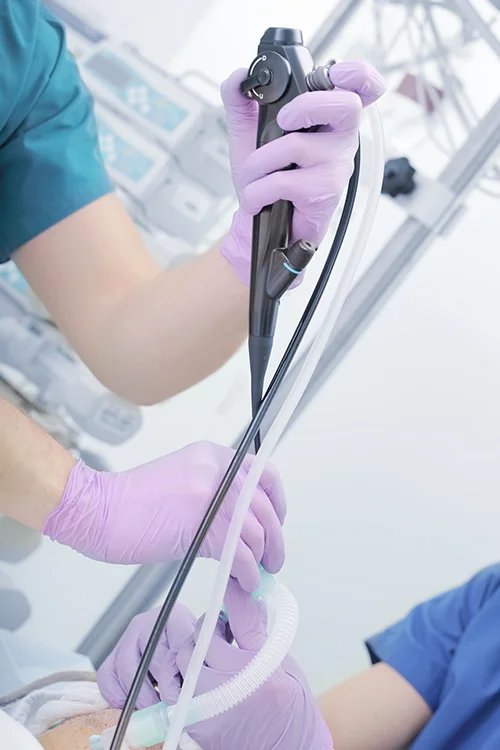
Bronchoscopy is a procedure that allows doctors to examine the airways of your larynx and lungs. During the procedure, a thin, flexible tube called a bronchoscope is inserted through the nose or mouth and guided into the lungs after the administration of conscious sedation (medication that makes one sleepy and relaxed) instead of general anaesthesia.
Bronchoscopy is used in diagnosing conditions like inflammation, tumours, and other respiratory issues.
Flexible bronchoscopy, also known as standard white light bronchoscopy, is typically performed using conscious sedation. This smaller, more flexible equipment allows access to the lower airways, such as the third order of bronchi, making it more widely used for both diagnostic and therapeutic procedures.
Rigid bronchoscopy also uses a white light source but involves a larger, more rigid piece of equipment that can only access the proximal airways. It requires general anaesthesia and is generally used for interventional procedures that flexible bronchoscopy cannot perform.
If you are experiencing a chronic cough that refuses to go away or you are coughing up blood, the specialists at Gleneagles Hospitals would recommend a bronchoscopy to better view the interiors of your airway to more accurately evaluate your symptoms.
This type of examination is also recommended when lung infections such as tuberculosis or lung cancers and scarring of the lung are suspected following other diagnosis like X-ray examinations. If any abnormalities are suspected, the bronchoscopy also allows tissue samples to be collected from the inside through a biopsy or bronchoalveolar lavage.
This procedure also offers therapeutic purposes, such as removing fluid or mucus and foreign objects that might have become lodged. A stent can also be used to widen narrowed airways and assist in laser tumour removals.
Preparing for a bronchoscopy involves several steps:
During a bronchoscopy, you will be sedated to ensure comfort. The procedure starts with inserting a bronchoscope through your nose or mouth, then gently guided down your throat into your lungs. The bronchoscope, equipped with a camera and light, allows your doctor to examine the airways. You might feel slight pressure but no pain. The doctor can take tissue samples, remove blockages, or perform other necessary treatments. The procedure typically lasts about 30 to 60 minutes.
After your bronchoscopy, you will be monitored in a recovery area until the effects of the sedation wear off, which usually takes a couple of hours. Here are key points to consider:
If you have any respiratory concerns or need a bronchoscopy, consult with a lung specialist at Gleneagles Hospitals. Schedule an appointment today to receive personalised, expert care. Your health is a priority.


Wait a minute